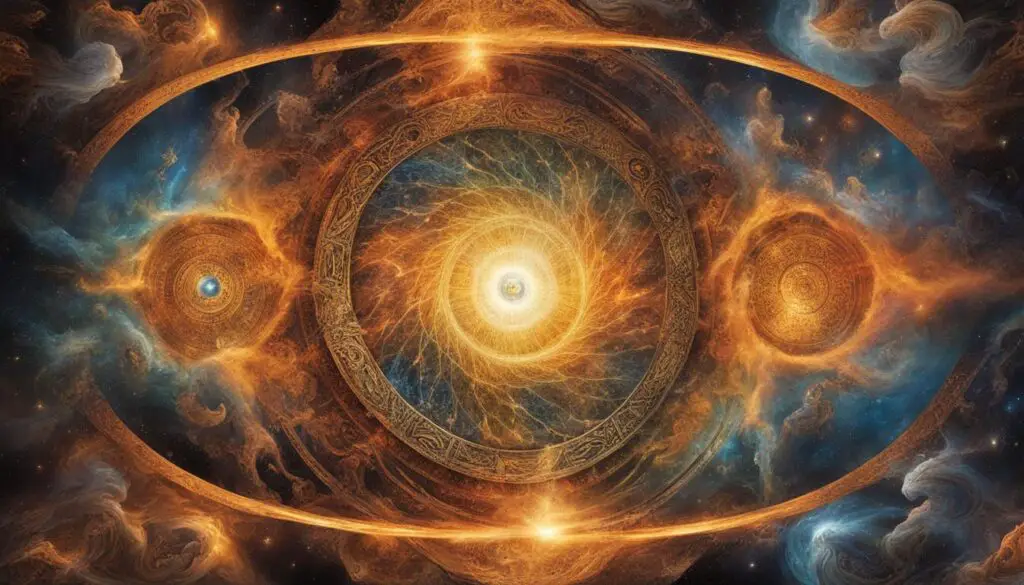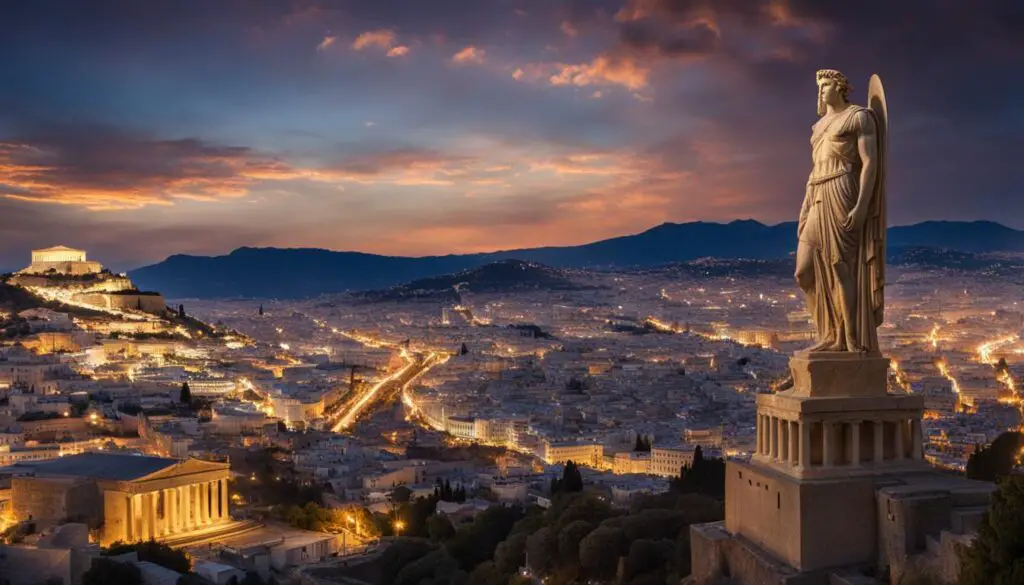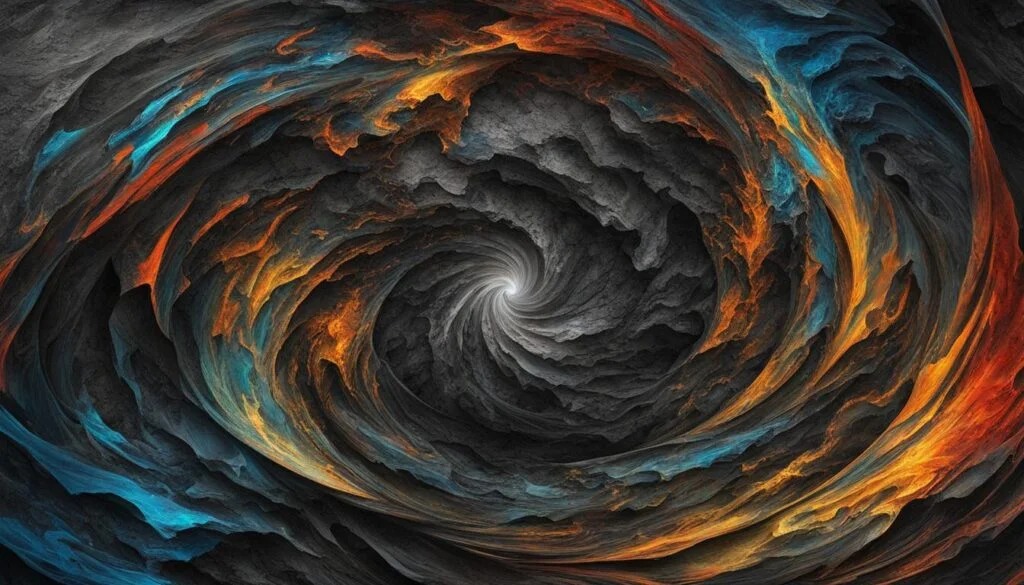Welcome to our deep dive into Greek mythology, where we explore the fascinating realm of ancient gods, mythical creatures, and epic tales. In this first section, we will shine a spotlight on Chaos, the primordial age that existed before all else in Greek mythology. So, what did Chaos do? Let’s find out!
Chaos, the embodiment of formless void and infinite space, played a pivotal role in the creation of the Greek mythological universe. From Chaos emerged the first entities and concepts of nature, setting the stage for the epic events and wars that unfolded. It gave birth to powerful beings such as Nyx and Erebus, personifying the night and darkness, as well as Eros, the embodiment of eternal love. The deepest depths of the underworld, Tartarus, and Gaia, the Earth herself, also sprung forth from Chaos. These primordial deities shaped the course of events in Greek mythology and left a lasting legacy.
Key Takeaways
- Chaos is the primordial age that existed before all else in Greek mythology.
- It gave birth to powerful beings such as Nyx, Erebus, Eros, Tartarus, and Gaia.
- Chaos set the stage for the creation of the Greek mythological universe.
- Nyx personified the night and darkness, while Eros embodied eternal love.
- Tartarus represents the deepest depths of the underworld, and Gaia is the Earth itself.
The Titans – Rulers of the Primordial Age
In Greek mythology, the primordial age was ruled by the Titans, powerful beings who reigned before the Olympian gods. At the forefront of this divine pantheon was Cronus, one of the Titans. He emerged as the leader and successfully overthrew his father, Ouranos, to claim his place as ruler. However, driven by his fear of being usurped by his own children, Cronus made the fateful decision to devour each of them upon their birth.
Among his offspring, Zeus, born to Cronus and Rhea, managed to escape this tragic fate. Hidden away by his mother, Zeus grew up in secrecy, preparing to challenge his tyrannical father’s rule. The conflict between the Titans and the Olympians, known as the Titanomachy, ensued for ten long years. Ultimately, Zeus and his siblings emerged triumphant, banishing the Titans to the depths of Tartarus.
This pivotal event marked the end of the Titans’ reign and the beginning of the era of the Olympian gods. Zeus, who now ascended to the throne, became the ruler of Mount Olympus and the supreme deity in Greek mythology. The Titans, once the dominant figures in the primordial age, were consigned to the underworld, while the Olympians assumed their roles as the new forces shaping the cosmos.
The Titanomachy: The Clash of the Titans
The Titanomachy, the epic war between the Titans and the Olympians, is a defining chapter in Greek mythology. This ten-year battle, fought with unmatched ferocity and divine powers, determined the course of the cosmos. The Olympians, led by Zeus, clashed with the Titans, who fought fiercely to maintain their dominion over the primordial age.
The outcome of the Titanomachy was a watershed moment, as it marked the triumph of the Olympians and the establishment of their reign. The war symbolized the shift in power from the older generation to a new divine order. It defined the hierarchy among the gods, with Zeus becoming the supreme ruler and the other Olympians assuming their respective domains.
- The Titans showcased immense strength and power, representing the raw forces of nature.
- The Olympians, on the other hand, embodied a more complex range of qualities, including wisdom, justice, and artistic expression.
- Through their victory, the Olympians established their reign, ensuring stability in the universe and paving the way for the creation of humanity.
The Titanomachy serves as a testament to the enduring struggle between old and new, a theme found in many myths and stories transcending cultures and time. It is a reminder that change and transformation are inherent in the natural order of things, and that even the most powerful beings are not immune to the forces of evolution.
The Creation of Humanity in Greek Mythology

In Greek mythology, the creation of humanity holds a significant place. According to the myths, Prometheus, a Titan, played a crucial role in this divine act. He sculpted humans out of clay, carefully shaping their forms with his skilled hands. To bring life to his creation, Athena, the goddess of wisdom, breathed her divine essence into these clay figures, endowing them with the breath of life.
But Prometheus’s involvement in the creation of humanity did not end there. The Titan defied the gods by stealing fire from Mount Olympus and gifting it to humans. This act of rebellion marked a pivotal moment in human history, as it bestowed upon humanity the power of fire, enabling progress, innovation, and the development of civilization.
The Gift of Fire: A Catalyst for Progress
The gift of fire from Prometheus had far-reaching consequences for humanity. With fire, humans could cook food, forge tools and weapons, stay warm in harsh climates, and illuminate the darkness. Fire became a symbol of enlightenment, creativity, and the indomitable spirit of humanity.
The Punishment of Prometheus
However, Prometheus’s audacious act did not go unnoticed by the gods. As punishment for his defiance, Zeus condemned Prometheus to eternal suffering. He was bound to a rock, where each day, an eagle would descend and devour his liver, only for it to regenerate overnight. This vicious cycle continued for years, serving as a reminder of Prometheus’s sacrifice and the consequences of challenging the divine order.
The creation of humanity and Prometheus’s defiance are timeless myths that reflect the human desire for progress, innovation, and the pursuit of knowledge. These stories continue to inspire us, reminding us of the power of human ingenuity and the enduring legacy of Greek mythology in our collective imagination.
The Mythological Depth of Greek Cosmogony
Greek cosmogony is a fascinating realm of myths and legends that offer profound insights into the ancient Greek understanding of the world and its natural phenomena. These captivating tales personify every element of nature, from the roaring seas to the gentle breeze, providing a vivid and enchanting tapestry of ancient beliefs and explanations.
Within the rich fabric of Greek mythology, we encounter a plethora of fantastical beings and deities, each representing a specific aspect of the cosmos. From the mighty Titans who ruled over the primordial age to the birth of gods and mythical creatures, these myths weave together a captivating narrative that transcends time.
H3: The Personification of Nature
One of the most intriguing aspects of Greek cosmogony lies in its personification of natural phenomena. Every thunderclap, every ray of sunlight, and every raging storm is attributed to the dynamic interplay of divine entities. Through these myths, the ancient Greeks sought to understand and appreciate the intricacies of the natural world, finding solace and meaning in their connection to the greater cosmos.
H3: Unveiling the Ancient Greek Understanding
Greek mythology offers a window into the ancient Greek understanding of the universe. These myths reflect a profound awareness of the interconnectedness of all things, where the actions of gods and mortals alike reverberate throughout creation. By delving into the depths of Greek cosmogony, we gain insights into the roots of Western philosophy, science, and culture, as well as a deeper appreciation for the enduring legacy of these ancient tales.
The fascination with Greek mythology continues to inspire modern interpretations in various art forms. From literature to film, these timeless tales find new life in contemporary retellings that capture the imaginations of new audiences. The enduring appeal of Greek cosmogony lies not only in its entertainment value but also in the enduring relevance of its themes, which explore the complexities of human existence and the mysteries of the universe.
In conclusion, Greek cosmogony offers a mythological depth that reveals the ancient Greek’s profound understanding of the world and its natural phenomena. These myths, with their personification of nature and their lessons on interconnectedness, continue to captivate and inspire us today. Through the lens of Greek mythology, we gain a deeper appreciation for our place in the universe, as well as the enduring cultural and artistic legacy of these ancient tales.
The Cultural Significance and Enduring Legacy of Greek Mythology

Greek mythology holds immense cultural significance and has left an enduring legacy that continues to reverberate in modern culture. These ancient myths and legends shaped the beliefs, rituals, and festivals of the ancient Greeks, providing a rich context for the worship of gods and goddesses. They offered explanations for natural phenomena and served as moral and ethical guides.
The influence of Greek mythology extends beyond the ancient world. It has inspired countless works of art, literature, and theater throughout history, from classical sculptures and paintings to epic poems and tragic plays. The themes and characters of Greek myths have found their way into modern literature, films, and even psychological concepts. The enduring popularity of these stories highlights their timeless relevance and universal appeal.
Key Points:
- Greek mythology shaped the beliefs, rituals, and festivals of ancient Greek society.
- It provided explanations for natural phenomena and served as moral and ethical guides.
- The influence of Greek mythology can be seen in art, literature, theater, and even psychological concepts.
- These myths continue to captivate and inspire people around the world, offering insights into the human experience.
Whether it’s the heroic adventures of Hercules, the tragic love stories of Aphrodite and Adonis, or the epic battles between gods and titans, Greek mythology has left an indelible mark on our cultural consciousness. Its stories continue to ignite our imagination, provoke thought, and offer valuable lessons about the human condition. As we explore the enduring legacy of Greek mythology, we gain a deeper understanding of our own history, culture, and the complexities of the world we inhabit.
Conclusion
Greek mythology takes us on a mesmerizing journey through the cosmic origins of our world. We delve into the power struggles of primordial beings and witness the rise of the mighty Olympian gods. These captivating myths also reveal the intriguing story of the creation of humanity.
With its rich tapestry of stories, Greek mythology reflects the ancient Greeks’ deep understanding of the universe and their relentless quest for knowledge. From Chaos, the primordial age that birthed all existence, to the Titans who ruled before the reign of the Olympians, every aspect of this mythology offers us a glimpse into the complexities of our own human experience.
Today, the enduring legacy of Greek mythology continues to inspire and captivate us. It holds a treasure trove of timeless lessons and insights into the human condition. Exploring these myths unlocks the secrets of our cosmic origins, the profound influence of primordial beings, and the divine creation of humanity.
As we immerse ourselves in the world of Greek mythology, we embark on a journey that transcends time and culture. It is a journey that invites us to ponder the mysteries of our own existence and seek a deeper understanding of the world we inhabit. Greek mythology truly stands as a testament to the enduring power of storytelling and its ability to connect us with our shared humanity.
FAQ
What role did Chaos play in Greek mythology?
Chaos was the primordial age that existed before all else in Greek mythology. It gave birth to powerful beings such as Nyx, Erebus, Eros, Tartarus, and Gaia.
Who were the Titans in Greek mythology?
The Titans were powerful beings who ruled over the primordial age before the Olympian gods. Kronos, one of the Titans, emerged as their leader.
What happened in the Titanomachy?
The Titanomachy was a ten-year war between the Titans and the Olympian gods. Zeus and his siblings emerged victorious and banished the Titans to Tartarus.
How did Prometheus contribute to the creation of humanity?
Prometheus, a Titan, formed humans out of clay and Athena breathed life into them. He also stole fire from the gods and gave it to humans, leading to their progress and development.
What is the significance of Greek mythology in ancient Greek society?
Greek mythology shaped the beliefs, rituals, and festivals of ancient Greek society. It influenced various artistic disciplines and continues to impact modern culture.
Why is Greek mythology still relevant today?
Greek mythology provides a captivating narrative that explores the cosmic origins of the world, the struggles of powerful beings, the creation of humanity, and reflects on the complexities of life.




